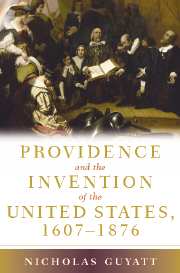Book contents
- Frontmatter
- Contents
- Acknowledgments
- Introduction
- PART ONE BRITAIN, AMERICA, AND THE EMERGENCE OF PROVIDENTIAL SEPARATISM
- PART TWO PROVIDENCE, RACE, AND THE LIMITS OF REVOLUTION
- 4 “Our Glorious Example”: The Limits of Revolutionary Providentialism
- 5 “Deifying Prejudice”: Race and Removal in the Early Republic
- 6 “Divided Destinies”: The Providential Meanings of American Slavery
- 7 “The Regenerated Nation”: The Civil War and the Price of Reunion
- 8 William Lloyd Garrison's Complaint
- Index
8 - William Lloyd Garrison's Complaint
Published online by Cambridge University Press: 12 December 2009
- Frontmatter
- Contents
- Acknowledgments
- Introduction
- PART ONE BRITAIN, AMERICA, AND THE EMERGENCE OF PROVIDENTIAL SEPARATISM
- PART TWO PROVIDENCE, RACE, AND THE LIMITS OF REVOLUTION
- 4 “Our Glorious Example”: The Limits of Revolutionary Providentialism
- 5 “Deifying Prejudice”: Race and Removal in the Early Republic
- 6 “Divided Destinies”: The Providential Meanings of American Slavery
- 7 “The Regenerated Nation”: The Civil War and the Price of Reunion
- 8 William Lloyd Garrison's Complaint
- Index
Summary
In the first weeks of 1865, Harper's New Monthly Magazine asked the New York minister Samuel Osgood to reflect on the meaning of the war and the prospects for the future. Osgood, who presided over the Unitarian Church of the Messiah on Broadway, had written regularly for Harper's during the war. In 1862 he had identified the black presence in America as “the great stumbling block in the way of the nation.” The following year, he fretted about the outcome of the conflict, and even suggested that “our religion does not enable us to write history in advance.” (He tempered this with the accompanying instruction that Americans should continue to hope for “the accomplishment of our providential destiny.”) As the war moved toward its conclusion in early 1865, with Lincoln returned to the White House, Osgood became more confident about the effects of the conflict upon the American people. They had been compelled to recognize an “organic relation” between the individual and the nation – a bond so intuitive that even schoolchildren could understand it, though it baffled the most distinguished Europeans. The war had demonstrated that the United States was not “an arbitrary compact or optional partnership,” but instead “a providential evolution and a solemn covenant.” The only cloud on the horizon was America's black population, which threatened the reunion between North and South.
- Type
- Chapter
- Information
- Providence and the Invention of the United States, 1607–1876 , pp. 299 - 326Publisher: Cambridge University PressPrint publication year: 2007

